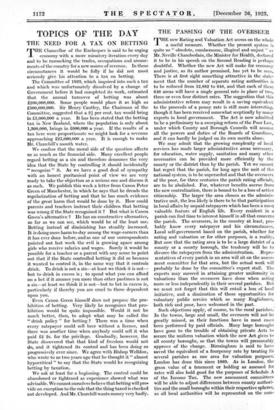TOPICS OF THE DAY
THE NEED FOR A TAX ON BETTING
THE Chancellor of the Exchequer is said to be urging economy with a more minatory iteration every day and to be ransacking the trades, occupations and amuse- ments of the country for a new source of revenue. In these circumstances it would be folly if he did not most seriously give his attention to a tax on betting. The Committee of 1923, which inquired into such a tax and which was unfortunately dissolved by a change of Government before it had completed its work, estimated that the annual turnover of betting was about £200,000,000. Some people would place it as high as £500,000,000. Sir Henry Cautley, the Chairman of the Committee, suggested that a 21 per cent. tax would bring in £5,000,000 a year. It has been stated that the betting tax in New Zealand, where the population is only about 1,300,000, brings in £600,000 a year. If the results of a tax here were proportionate we might look for a revenue approaching £25,000,000 a year. It is enough to make Mr. Churchill's mouth water.
We confess that the moral side of the question affects us as much as the financial side. Many excellent people regard betting as a sin and therefore denounce the very idea that the State by controlling it should incidentally " recognize " it. As we have a good deal of sympathy with an honest puritanical point of view we are very ready to take the objection as a serious one and discuss it as such. We publish this week a letter from Canon Peter Green of Manchester, in which he says that he dreads the regularization of betting and that he has much evidence of the great harm that would be done by it. How could parents and teachers instruct their children that betting was wrong if the State recognized it ? But what is Canon Green's alternative ? He has no constructive alternative, so far as we can see, which would be of the least use. Betting instead of diminishing has steadily increased. It is doing more harm to-day among the wage-earners than it has ever done before, and as one of our correspondents pointed out last week the evil is growing apace among girls who receive salaries and wages. Surely it would be possible for a teacher or a parent with any sense to point out that if the State controlled betting it did so because it wanted to control it, in the same way that it controls drink. To drink is not a sin—at least we think it is not— but to drink in excess is ; to spend what you can afford on a bet if it amuses you more than other pastimes is not a sin—at least we think it is not—but to bet in excess is, particularly if thereby you are cruel to those dependent upon you. . Even Canon Green himself does not propose the pro- hibition of betting. Very likely he recognizes that pro- hibition would be quite impossible. Would it not be much better, then, to adopt what may be called the " drink policy " for betting ? There was a time when every ratepayer could sell beer without a licence, and there was another time when anybody could sell it who paid £2 2s. for the privilege. Gradually, however, the State discovered that that kind of freedom would not do, and it tightened its control and has been doing so progressively ever since. We agree with Bishop Welldon, who wrote to us two years ago that he thought it " almost hypocritical " to say that the State would be recognizing betting by taxation. We ask at least for a beginning. The control could be abandoned or tightened as experience showed what was advisable. We cannot ourselves believe that betting will pro. vide an exception to the rule that the thing taxed is checked not developed. And Mr. Churchill wants money very badly.






































 Previous page
Previous page